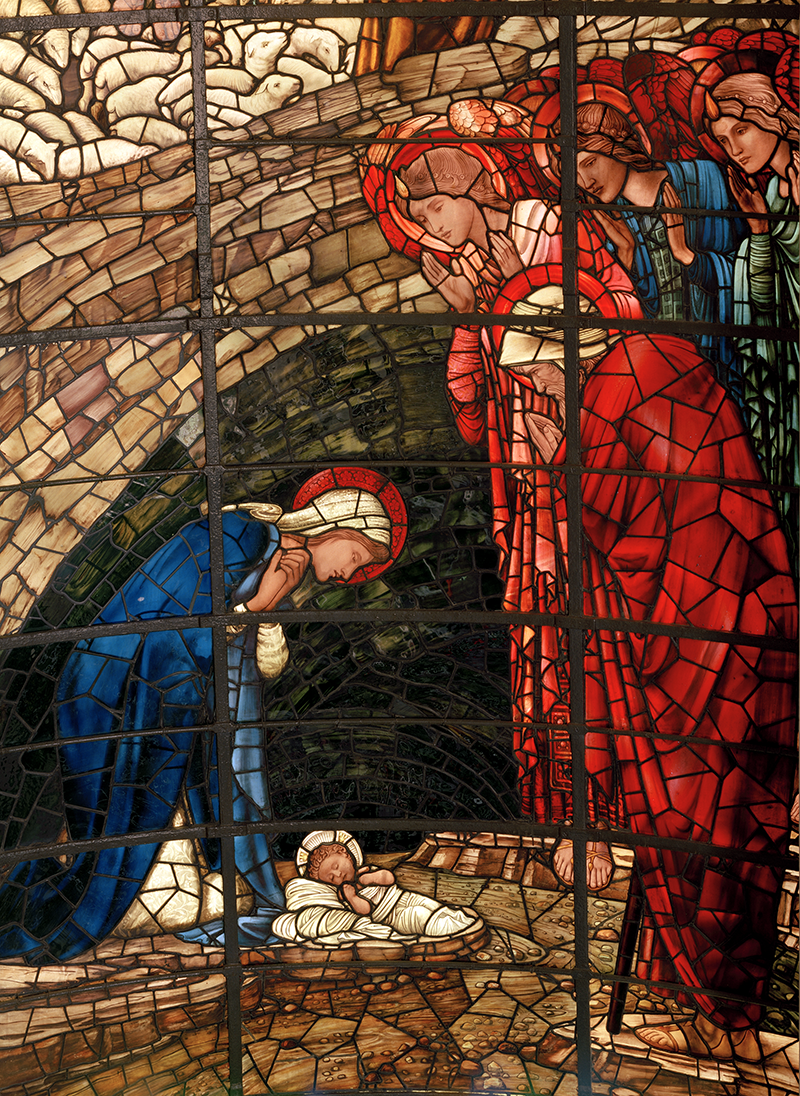Isaiah 7:1-9 Isaiah gives a word from the LORD to King Ahaz of Judah when King Rezin of Syria and King Pekah of Israel attack Jerusalem in 731BC (see 2 Kings 16:5). “Be careful. Be calm and don't worry.” (Isaiah 7:4)

"Keep Calm" (Isaiah 7:4) - British Government Poster, 1939
Isaiah 7:10-25 Isaiah then gives King Ahaz reassurance that God has not deserted him. "The Lord himself will give you a sign: the virgin* will be pregnant. She will have a son, and she will name him Immanuel*. He will be eating milk, curds and honey when he learns to reject what is evil and to choose what is good." (Isaiah 7:14-15)
*This translation (New Century Version © Thomas Nelson Inc.) has a footnote pointing out that the Hebrew word translated 'virgin' simply means "a young woman", while 'Immanuel' means "God is with us".
The Good News Bible (Today's English Version © The Bible Societies) translates this passage, “A young woman who becomes pregnant will have a son and will name him ‘Immanuel’. By the time he is old enough to make his own decisions, people will be drinking milk and eating honey. Even before that time comes, the lands of those two kings who terrify you will be deserted.” (Isaiah 7:14-16)
Who does the "young woman" in this passage refer to?
Isaiah 8:3-4 Shortly after this, Isaiah’s wife becomes pregnant. The LORD tells Isaiah that before his son is old enough to say ‘Mummy’ and ‘Daddy’, all the wealth of Damascus (the capital of Syria) and all the loot of Samaria (the capital of Israel) will be carried off by the King of Assyria. These prophesies are fulfilled in 731BC and 722BC, respectively.
You can find details of the fall of Syria in 731BC at The Assyrians (& in 2 Kings 16:9), and an account of the fall of Israel in 722BC at Israel falls & the exiles are led to Assyria (& in 2 Kings 17:5-6).

"The king of Assyria will take away all the wealth of Damascus..." (Isaiah 8:4) (Mewes)
Immanuel
King Ahaz was facing defeat and almost certain death when Syria joined forces with Israel to attack the southern kingdom of Judah in 731BC. In this desperate situation, Isaiah was given a sign from God that he had not abandoned Judah.
He told the king that a young woman would shortly give birth to a son and name him ‘Immanuel’, meaning ‘God is with us’. Before the child had grown up, the danger from Syria and Israel would pass as both nations would be attacked and defeated by Assyria (see Isaiah 7:14-16). A short time later, Isaiah’s young wife gave birth to a son, and Isaiah was reminded again that Syria would soon be defeated (see Isaiah 8:3-4). Damascus (the capital of Syria) was, indeed, destroyed by Assyria within a few months, and Israel was conquered nine years later in 722BC.
While the promise of a child named ‘Immanuel’ was fulfilled in the events of 731BC, Matthew, in his New Testament gospel, states that the prophesy of Isaiah was also looking ahead seven hundred years to the birth of Jesus Christ. He relates how Mary, through the power of the Holy Spirit, conceived Jesus. He then adds, “All this happened to bring about what the Lord had said through the prophet: "The virgin will be pregnant. She will have a son, and they will name him Immanuel," which means "God is with us"." (Matthew 1:22-23)

"And they will name him Immanuel, God is with us" (Matthew 1:22-23)
Isaiah 8:19-20 Some of the beseiged residents of Jerusalem in 731BC are tempted to consult the dead through spitualists and “ask the mediums and fortune-tellers, who whisper and mutter, what to do.” (Isaiah 8:19)
Isaiah tells them, “people should ask their God for help. Why should people who are still alive ask something from the dead? You should follow the teachings and the agreement with the LORD. The mediums and fortune-tellers do not speak the word of the LORD, so their words are worth nothing." (Isaiah 8:19-20)
